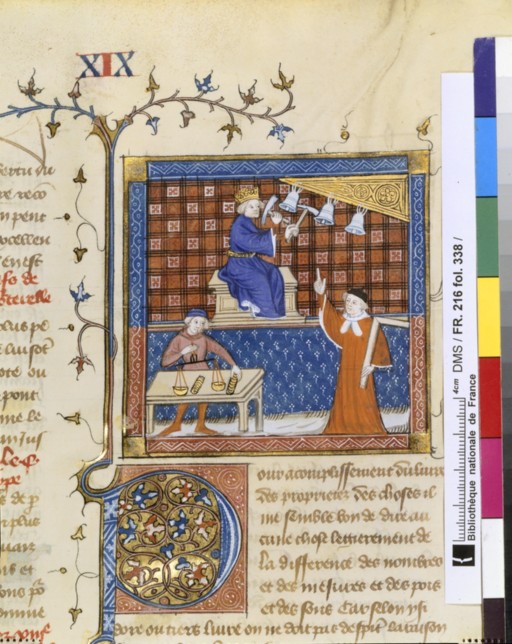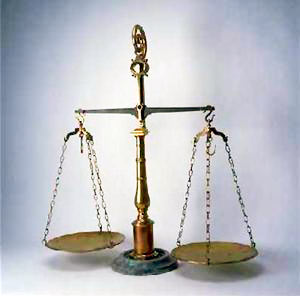This is my interpretation of the Voynich Libra scales. When I model these things I don't go for strict accuracy of the Voynich artist's drawings, but try to interpret the intentions of the artist. That is, what it is they were trying to represent.
For instance in this case, the frame that the lever hangs from is askew in the Voynich illustration. It is not properly lined up with the fulcrum of the lever. I assumed that the "disk" seen on the lever was intended as the pivot, and placed it where it would be, in a real scale. And the frame opening seems to be much wider on the Voynich drawing, but that is, I think, in an attempt to avoid the indicator/pointer. The hanger's sides would normally be just outside of the lever, giving just enough clearance for the lever to freely swing. I also added a couple of knots, as the Voynich scale seems to have a thick end to the rod on one side, and I would think it plausible the pail strings were meant to be tied there... of course the artist didn't show the knots, but I think it is a small addition, that doesn't change the design nor technology of the scale.
So I try not to modify anything beyond what was meant to be in the drawing, but do modify a bit.
I'm working on a new blog post, "The Voynich in 3D", which will have several items I've modeled from Voynich illustrations from the first ones in 2009, up to recently. The scales are new, and I think I'm going to do one or two more items I've wanted to make.
Rich.
The Libra Scales in 3D
Forum rules
All ideas are welcome, but please be civil with each other.
All ideas are welcome, but please be civil with each other.
The Libra Scales in 3D
"Man is the measure of all things: What is, that it is; what is not, that it is not"- Protagoras
- Stellarwest
- Posts: 34
- Joined: Sun Apr 12, 2020 9:16 am
- Location: Everywhere
- Contact:
Re: The Libra Scales in 3D
@Rich
I'm extremely impressed by this transfer of a 2d image of the scales of balance in the voynich manuscript to a 3d image. This is beautiful Rich, job well done. It does somewhat look like something from the early 15th century which would give more credence to the carbon dating of the calf-skin. How many hours did this take you to complete this and the bowls at the ends of the ropes retain a great lighting effect.
Rich I just thought to my self this image of the 3d scales of balance might actually exist to some degree in a museum and might mirror what you have done. If so then one could date it and maybe find the location it came from. Maybe some sort of provenance hunt for the Voynich Manuscript.
I'm going to do a net search for a blue metal 15th century scales of balance. This really blows my mind as you know you and I believe the possibility of the Voynich Manuscript may have not been from 1404-1438. Well now looking at your 3d rendering and the images below I feel that the carbon dating maybe spot on thus making the voynich manuscript a true wonder to me.
Thanks for the inspiration Rich you are a great friend
I found an image of one:

And look to the background looks like a sketch of one.

A real 15th century scale:

I'm extremely impressed by this transfer of a 2d image of the scales of balance in the voynich manuscript to a 3d image. This is beautiful Rich, job well done. It does somewhat look like something from the early 15th century which would give more credence to the carbon dating of the calf-skin. How many hours did this take you to complete this and the bowls at the ends of the ropes retain a great lighting effect.
Rich I just thought to my self this image of the 3d scales of balance might actually exist to some degree in a museum and might mirror what you have done. If so then one could date it and maybe find the location it came from. Maybe some sort of provenance hunt for the Voynich Manuscript.
I'm going to do a net search for a blue metal 15th century scales of balance. This really blows my mind as you know you and I believe the possibility of the Voynich Manuscript may have not been from 1404-1438. Well now looking at your 3d rendering and the images below I feel that the carbon dating maybe spot on thus making the voynich manuscript a true wonder to me.
Thanks for the inspiration Rich you are a great friend
I found an image of one:
And look to the background looks like a sketch of one.
A real 15th century scale:

"Speak Truth to Power"

Re: The Libra Scales in 3D
Hi Stellar! Thank you for the nice comments about the model. And you found some great examples of similar scales!
I actually only took about an hour or less to make it. Most objects are made of what are called standard objects, such as a box, sphere, plane, cylinder, tube. Then there are more complex shapes such as a torus (donut), chamfered cylinder, chamfered box, etc. Their proportions can be changed, they can be cut apart or assembled in different ways, by cutting, dragging, merging, and so on. So it is a matter or using shapes in CAD, then manipulating them to turn them into the shapes you need.
For instance, the strings holding the bowls are cylinders. I made one, then tipped it inward. Then I cloned it five more times, and dragged and rotated those to where I wanted them. The holding ring is a tube, made to size, then squished down in one dimension, and attached to the frame.
Anyway, not a CAD site, but just to let you know not too difficult. If you or anyone wants to try this to make their own objects, there is a free program called Blender.
You found a couple of very close scales to the VMs scale I think. The frame at the top of the first two looks very close to the CAD version, and so, probably is what the VMs artist meant. And I had come to the same conclusion as you did, some time back when the structure of the VMs scale was only in my head... that scales of this type did exist at the time of the Carbon dating, and before even. However I don't personally feel this helps to date the Voynich, because it is only the newest object that dates anything, not the oldest. I always use the example of an American $10 bill, because it has a 1930's car on the back. It doesn't make the bill from 1930. But a 2021 car would make it as new as 2021.
A 15th century scale can be copied at anytime, though, and I personally believe it was copied in 1910, because of what I feel are so many much newer items in the Voynich, going up to 1909.
The only features of the scale that I've never seen... I don't think I've ever seen them elsewhere... are the rods out the ends, holding the tray/bucket strings. The frame, the arm, the tray/buckets, are all on other scales. But the idea of a boxy beam (blue) with rods coming out, that would be something to look out for. But of course the blue I used because the artist did, and it is unusual. Of course look out for blue, but that is possibly just the whim of the artist. One implication of the blue might be that the beam was not meant to be metal, but wood.
Rich.
I actually only took about an hour or less to make it. Most objects are made of what are called standard objects, such as a box, sphere, plane, cylinder, tube. Then there are more complex shapes such as a torus (donut), chamfered cylinder, chamfered box, etc. Their proportions can be changed, they can be cut apart or assembled in different ways, by cutting, dragging, merging, and so on. So it is a matter or using shapes in CAD, then manipulating them to turn them into the shapes you need.
For instance, the strings holding the bowls are cylinders. I made one, then tipped it inward. Then I cloned it five more times, and dragged and rotated those to where I wanted them. The holding ring is a tube, made to size, then squished down in one dimension, and attached to the frame.
Anyway, not a CAD site, but just to let you know not too difficult. If you or anyone wants to try this to make their own objects, there is a free program called Blender.
You found a couple of very close scales to the VMs scale I think. The frame at the top of the first two looks very close to the CAD version, and so, probably is what the VMs artist meant. And I had come to the same conclusion as you did, some time back when the structure of the VMs scale was only in my head... that scales of this type did exist at the time of the Carbon dating, and before even. However I don't personally feel this helps to date the Voynich, because it is only the newest object that dates anything, not the oldest. I always use the example of an American $10 bill, because it has a 1930's car on the back. It doesn't make the bill from 1930. But a 2021 car would make it as new as 2021.
A 15th century scale can be copied at anytime, though, and I personally believe it was copied in 1910, because of what I feel are so many much newer items in the Voynich, going up to 1909.
The only features of the scale that I've never seen... I don't think I've ever seen them elsewhere... are the rods out the ends, holding the tray/bucket strings. The frame, the arm, the tray/buckets, are all on other scales. But the idea of a boxy beam (blue) with rods coming out, that would be something to look out for. But of course the blue I used because the artist did, and it is unusual. Of course look out for blue, but that is possibly just the whim of the artist. One implication of the blue might be that the beam was not meant to be metal, but wood.
Rich.
"Man is the measure of all things: What is, that it is; what is not, that it is not"- Protagoras